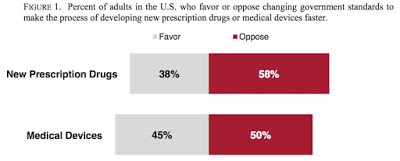As reported by STATnews (here), “a majority of Americans opposes federal regulatory changes to speed up the development and approval of new medical treatments.” This was one result of a new poll of 1,006 randomly selected adults, ages 18 and older, conducted via phone by Stat and Harvard T.H. Chan School of Public Health. The “regulatory changes” are part of the 21st Century Cures Act (H.R. 6), which passed the House in 2015.
 |
| Click on image for enlarged view. |
FDA Commissioner Robert Califf warned that if the 21st Century Cures legislation “is not carefully crafted it could pose a significant risk” for patients. “Innovative therapies are not helpful to patients” if they don’t work or they cause harm, Califf said at the Food and Drug Law Institute’s Annual Conference (“FDA Commish Califf Not In Tune with #Pharma viz-a-viz 21st Century Cures Act?“).
But many Americans have issues other than safety if drugs are approved too fast, according to the Harvard-STAT survey. Let’s look at some of the results of this survey in more detail, leaving aside the inherent bias of telephone surveys (who answers their phones these days without screening messages first?).
When asked “If government standards were changed to speed up the development, testing and review of new prescription drugs, do you believe it would make the price of those drugs higher, lower, or do you think it would not have much of an impact on the price of new drugs?”, 38% of respondents said it would result in higher prices, which proves you can fool 62% of the people some of the time.
 |
| Click on image for enlarged view. |
The statistical same percent (39%) of respondents said it would lower the price of drugs. They may have mistakenly thought that faster approval = lower cost of development = lower cost to payers. As we have seen with companies such as Turing and Valeant, lower development costs have nothing to do with drug prices. Even Ian Read, CEO of Pfizer, has made clear publicly and privately, his main priority is doing well by his shareholders (here).
One last interesting finding: About three in five (57%) adults in the U.S. say they support removing prescription drug advertisements from television, while less than two in five (39%) say they oppose this change. There were no significant differences in opinion on this question by party, income, or sex.








![6 Digital Tools at the Center of Healthcare Digitalization [INFOGRAPHIC]](http://ec2-54-175-84-28.compute-1.amazonaws.com/pharma-mkting.com/wp-content/uploads/2021/04/6DigitalTools_600px-100x70.jpg)




